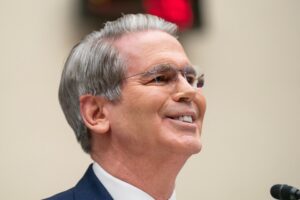The Dictatorship
At the FBI, Kash Patel prioritizes the spotlight over credibility
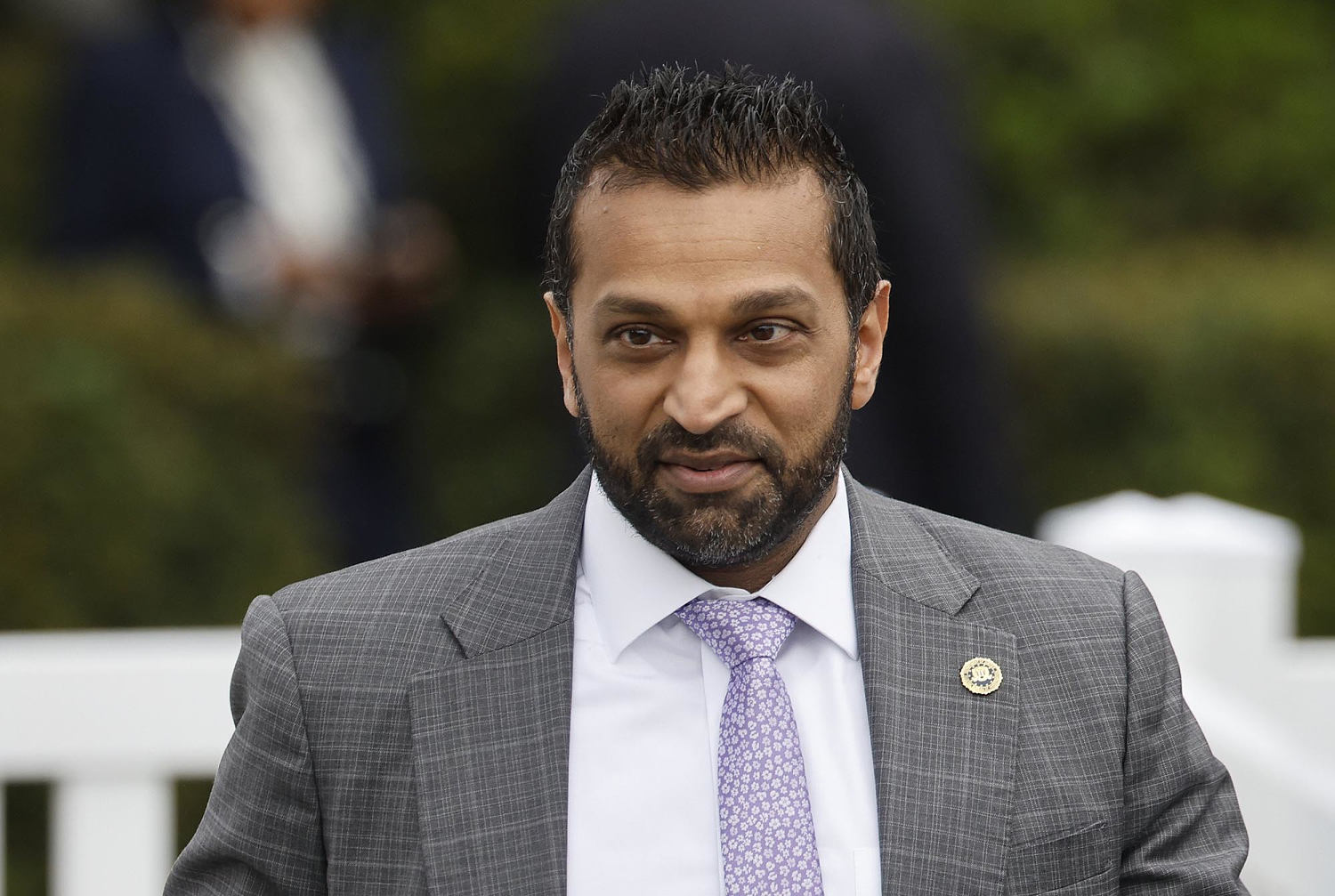
When Kash Patel arrived at the FBI as its new director a couple of months ago, he faced the kind of credibility hurdles his predecessors didn’t have to worry about. If Patel was going to be seen as a serious and capable figure, one who is prepared to help lead federal law enforcement, he would have to invest time and energy into proving his mettle, rolling up his sleeves and doing real work on behalf of the bureau.
Or perhaps not. The New York Times reported:
Kash Patel flew to Miami on Air Force One last weekend to watch an Ultimate Fighting Championship event, wearing his signature wraparound sunglasses — at least the second time he has gone to a mixed-martial arts fight as F.B.I. director. Days earlier, he showed up at two N.H.L. games, grinning in photographs with the hockey legend Wayne Gretzky. … And since taking over the agency, Mr. Patel has been a noticeable presence at President Trump’s side, delivering a warm-up speech at the Justice Department before Mr. Trump himself spoke and hovering behind him during the U.F.C. match in Miami.
The Times’ report added that while his FBI predecessors did their jobs with minimal fanfare, reluctant to detract from the bureau’s work, Patel has thrown caution to the win, “embracing the spotlight.”
This included an instance last month in which Patel was included in an FBI recruitment video — wearing hunting camouflage — in a move that the Times said “rankled some former and current agents as performative.”
Just as notably, the report, which has not been independently verified by BLN or NBC News, alleged that Patel appears to have used FBI planes for personal travel — something that some congressional Republicans criticized when Donald Trump’s first handpicked director, Chris Wray, took similar trips.
But I’m also struck by Patel’s apparent indifference to the broader circumstances.
As my BLN colleague Ja’han Jones summarized in February, “Patel’s confirmation makes a conspiracy theorist and Donald Trump loyalist the federal government’s top crime-fighter. Patel has issued public threats to go after Trump’s perceived political enemiesincluding publishing a list of members of the so-called deep state he’d investigate if given power. He has also openly promoted the QAnon conspiracy theory and shown support for the violent insurrectionists who stormed the Capitol to overturn the 2020 election on Jan. 6, 2021.”
Indeed, after his Senate confirmation hearing, Patel’s record became even more controversialnot less, making it that much more implausible that senators would confirm a partisan operative with very little experience in federal law enforcement who’d been condemned by some of his former Trump administration colleagues.
And then Republicans confirmed him anywaygiving Patel an opportunity to prove himself as a serious official deserving of such power.
Two months later, he doesn’t appear to have made much of an effort to shake his reputation as an unqualified amateur. Since taking office, Patel has misstated key elements of the FBI’s recent work. He reportedly confused intelligence and counterintelligence. He said he planned to spend a lot of time in Las Vegaswhere he’s been living, even as others were told that remote work is prohibited. He ordered officials to relocate 1,500 employees from Washington, D.C., and when told the bureau didn’t have the resources for such a restructuring, he reportedly told his subordinates to simply figure out a way to execute his directive.
Perhaps most importantly, the FBI director has taken steps to break down the firewalls that used to exist between his office and the White House. NBC News reported that Patel went so far as to ask about creating a possible hotline that would facilitate direct communication between him and Trump.
In case that weren’t quite enough, NBC News reported on Patel also placing Brian Auten, a government expert on Russia, on leave — which was notable because Auten’s name appeared on Patel’s published list of alleged “deep state” actors.
These are not the actions of an official who is eager to bolster his credibility. These are, however, the actions of an official confident in the knowledge that the incumbent president only ousts FBI directors who fail to honor his political whims.
Steve Benen is a producer for “The Rachel Maddow Show,” the editor of MaddowBlog and an BLN political contributor. He’s also the bestselling author of “Ministry of Truth: Democracy, Reality, and the Republicans’ War on the Recent Past.”
The Dictatorship
Treasury Secretary Bessent’s testimony descends into shouting matches
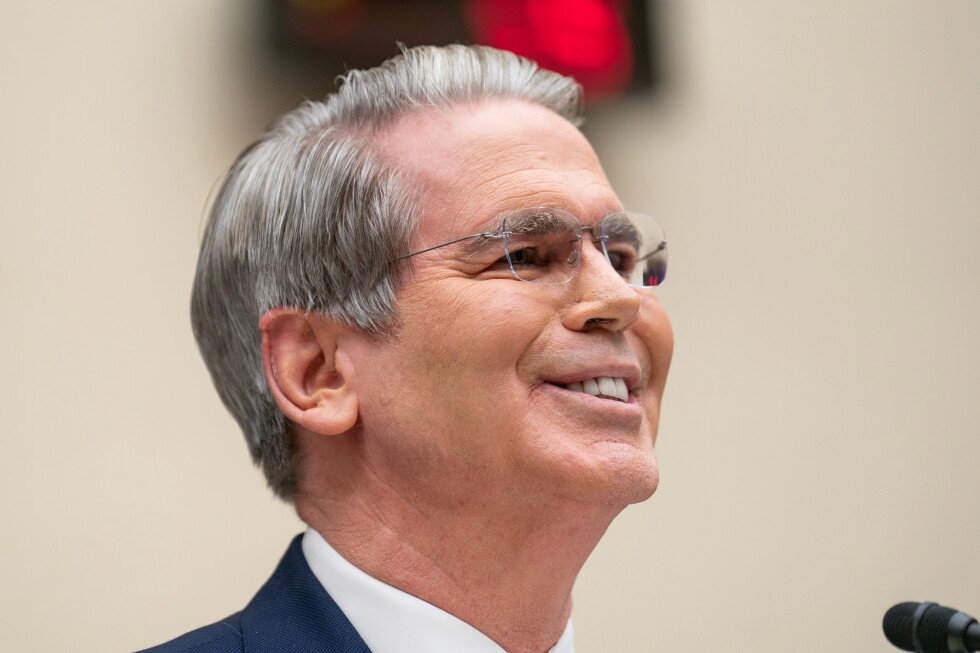
WASHINGTON (AP) — A hearing about oversight of the U.S. financial system devolved into insults several times Wednesday as Treasury Secretary Scott Bessent clashed with Democratic lawmakers over fiscal policy, the business dealings of the Trump family and other issues.
Appearances by treasury secretaries on Capitol Hill are more typically known for staid exchanges over economic policy than for political theater, but Wednesday’s hearing of the House Financial Services Committee hearing featured several fiery exchanges between the Republican Cabinet member and Democrats, with Bessent even lobbing insults back to the lawmakers.
Bessent called Rep. Sylvia Garcia “confused” when she questioned how undocumented immigrants could affect housing affordability across the country, prompting the Texas Democrat to snap back, “Don’t be demeaning to me, alright?”
Bessent later mocked a question from Rep. Stephen Lynch, D-Mass., about shuttered investigations into cryptocurrency firms. Lynch expressed frustration with Bessent’s interruptions, saying, “Mister Chairman, the answers have to be responsive if we are going to have a serious hearing.”
Bessent replied, “Well, the questions have to be serious.”
After a back-and-forth over whether tariffs cause inflation or one-time price increases for consumers, California Democratic Rep. Maxine Waters asked committee leaders to intervene with Bessent: “Can someone shut him up?”
And in a fiery exchange with Rep. Gregory Meeks over the Abu Dhabi royal family’s investment into the Trump family’s World Liberty Financial cryptocurrency firm last year, the New York Democrat dropped an F-bomb as he shouted at Bessent: “Stop covering for the president! Stop being a flunky!”
The Treasury Department did not immediately respond to a request for comment on the fireworks.
Bessent’s performance was “not a role you typically see a treasury secretary play,” said Graham Steele, a former assistant secretary for financial institutions under Biden-era Treasury Secretary Janet Yellen. The department has traditionally “been removed from some of the day-to-day, hand-to-hand political combat,” Steele said in an interview.
He recalled his former boss having tense exchanges over climate change and policy issues with Republican lawmakers during committee hearings, but the exchanges were not personal, he said, noting treasury secretaries have to strike a “delicate balance” of working with the White House while safeguarding the “economic stature” of the country internationally.
In recent months, Bessent has ratcheted up his insults when it comes to Democratic leaders.
He has called California Gov. Gavin Newsom “economically illiterate,” compared him to the fictional serial killer Patrick Bateman, and called him “a brontosaurus with a brain the size of a walnut.” He has on several occasions called Massachusetts Sen. Elizabeth Warren an “American Peronist” after she told American financial institutions not to finance the Trump administration’s massive support package for Argentina.
Bessent’s combativeness is, in part, a sign of the times, said David Lublin, chair of the Department of Government at American University’s School of Public Affairs.
“President Trump has shown he likes belligerence and he likes nominees and others who defend him vociferously,” Lublin told The Associated Press.
“It’s hard to say that this is unusual for this political environment. What used to be the normal modicum of respect for Congress has frayed to the point of vanishing,” Lublin said.
What was unusual, in Lublin’s view, was for Bessent to reveal his thoughts on monetary policy — normally the purview of the Federal Reserve — and his insistence that Trump has the right to interfere with the decision-making of the central bank. “You have a cabinet secretary defending the president’s efforts to erode institutions,” Lublin said.
On Thursday, Bessent will get another opportunity to spar with lawmakers. He is scheduled to appear before the Senate Banking, Housing and Urban Affairs Committee on the same topic: the annual report by the Financial Stability Oversight Council, which Bessent leads.
The Dictatorship
DHS lawyer removed after telling judge ‘this job sucks’
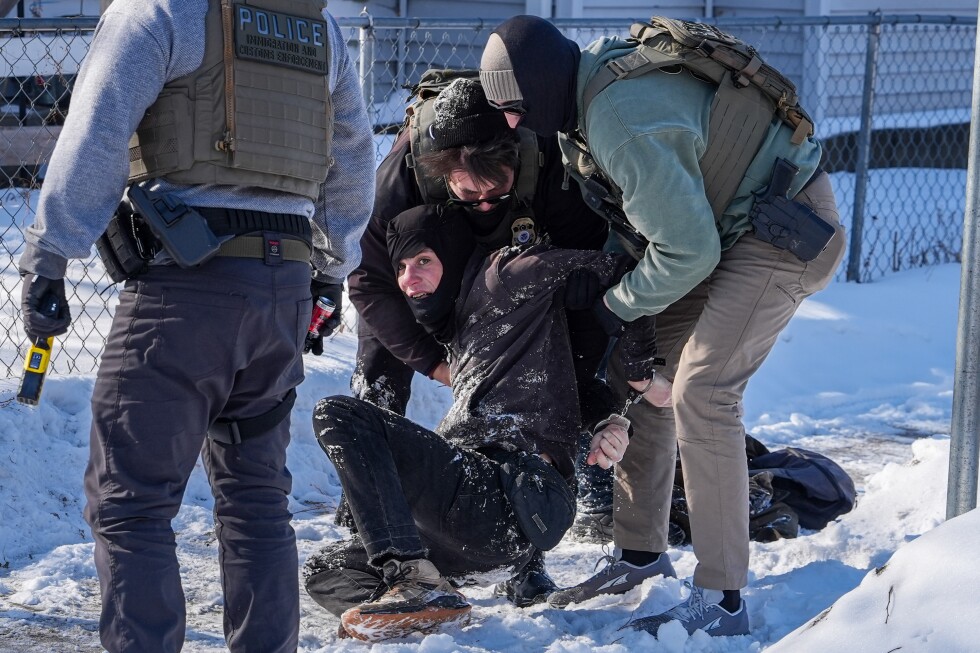
WASHINGTON (AP) — A government lawyer who told a judge that her job “sucks” during a court hearing stemming from the Trump administration’s immigration enforcement surge in Minnesota has been removed from her Justice Department post, according to a person familiar with the matter.
Julie Le had been working for the Justice Department on a detail, but the U.S. attorney in Minnesota ended her assignment after her comments in court on Tuesday, the person said. The person spoke on the condition of anonymity to discuss a personnel matter. She had been working for U.S. Immigration and Customs Enforcement before the temporary assignment.
At a hearing Tuesday in St. Paul, Minnesota, for several immigration cases, Le told U.S. District Judge Jerry Blackwell that she wishes he could hold her in contempt of court “so that I can have a full 24 hours of sleep.”
“What do you want me to do? The system sucks. This job sucks. And I am trying every breath that I have so that I can get you what you need,” Le said, according to a transcript.
Le’s extraordinary remarks reflect the intense strain that has been placed on the federal court system since President Donald Trump returned to the White House a year ago with a promise to carry out mass deportations. ICE officials have said the surge in Minnesota has become its largest-ever immigration operation since ramping up in early January.
Several prosecutors have left the U.S. Attorney’s office in Minnesota amid frustration with the immigration enforcement surge and the Justice Department’s response to fatal shootings of two civilians by federal agents. Le was assigned at least 88 cases in less than a month, according to online court records.
Blackwell told Le that the volume of cases isn’t an excuse for disregarding court orders. He expressed concern that people arrested in immigration enforcement operations are routinely jailed for days after judges have ordered their release from custody.
“And I hear the concerns about all the energy that this is causing the DOJ to expend, but, with respect, some of it is of your own making by not complying with orders,” the judge told Le.
Le said she was working for the Department of Homeland Security as an ICE attorney in immigration court before she “stupidly” volunteered to work the detail in Minnesota. Le told the judge that she wasn’t properly trained for the assignment. She said she wanted to resign from the job but couldn’t get a replacement.
“Fixing a system, a broken system, I don’t have a magic button to do it. I don’t have the power or the voice to do it,” she said.
Homeland Security Assistant Secretary Tricia McLaughlin said Le was a probationary attorney.
“This conduct is unprofessional and unbecoming of an ICE attorney in abandoning her obligation to act with commitment, dedication, and zeal to the interests of the United States Government,” McLaughlin said in a statement.
Le and the U.S. Attorney’s office in Minnesota didn’t immediately respond to emails seeking comment.
Kira Kelley, an attorney who represented two petitioners at the hearing, said the flood of immigration petitions is necessary because “so many people being detained without any semblance of a lawful basis.”
“And there’s no indication here that any new systems or bolded e-mails or any instructions to ICE are going to fix any of this,” she added.
The Dictatorship
‘Monster’s Paradise’ lampooning Trump has world premiere at Hamburg Opera
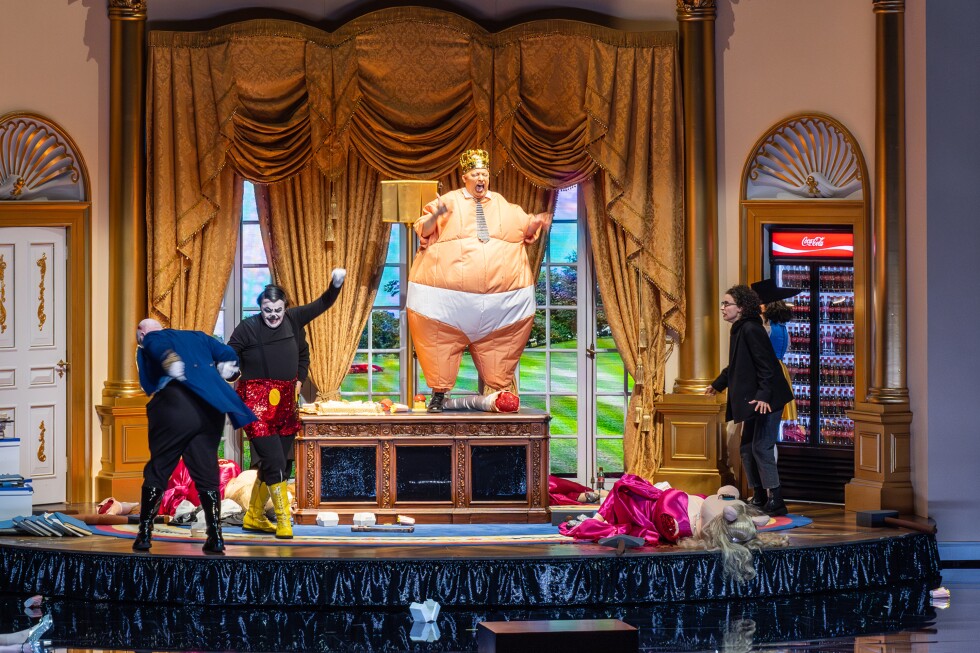
HAMBURG, Germany (AP) — Tobias Kratzer spoke in disbelief ahead of the world premiere of “Monster’s Paradise” by Olga Neuwirth and Elfriede Jelinek, which features a gluttonous, ravenous, insatiable President-King, lampooning U.S. President Donald Trump.
“The metaphor has become a reality,” the Hamburg State Opera artistic director said in his office Sunday morning. “I’m really hoping in — what is it, eight hours? — the piece is not completely outdated because up until now it has always gone closer and closer to not being a satire but being reality.”
Jelinek, 79 and winner of the 2004 Nobel Prize in Literature, collaborated with Neuwirth for the first time in two decades, the Austrian duo combining on a German-language libretto. The 57-year-old Neuwirth won the 2022 Grawemeyer Award for Music Composition, three years after she became the first woman composer with a work presented at the Vienna State Opera.
Chorus members dressed as zombies and roamed the foyers before the opera and during the intermission, along with Disney-styled princesses and dancing hot dogs. The opera began with a Las Vegas-style LED sign and action on a passerelle.
A 19th-century satire was the starting point
Alfred Jarry’s 1896 play “Ubu Roi” was the inspiration, a profane, scatological work that had a one-performance run in Paris, cut short by an angry audience response.
Aspects of Jarry’s King Wenceslas and Ubu characters were adapted into The President-King for what Neuwirth and Jelinek call a Grand Guignol opera, which has a six-performance run through Feb. 19. It moves to the Zurich Opera from March 8 to April 12 and next season to Austria’s Oper Graz. An audio recording is planned.
The President-King entered in a gilded Oval Office with a Coca-Cola filled refrigerator. A golden crown sat on his desk along with a red button that jettisoned visitors such as an Elvis Presley impersonator in the manner of a TV game show as a trio of red X-shaped lights flashed. A woman resembling Melania Trump lurked in the background.
“I have long known Jarry’s play, but when Trump came to power, I instantly thought of it,” Jelinek said in an emailed response to questions translated from German.
Vampi and Bampi, a pair of pun-prone vampires sung by Sarah Defrise and Kristina Stanek, are avatars of the authors during five scenes that unfold over 2 hours, 45 minutes, and they frame action in the manner of Wagner’s Rheinmaidens and Norns. The President-King (sung by Georg Nigl) is opposed by Gorgonzilla (Anna Clementi), a monster spawned by a nuclear accident. One of the early titles was “Godzilla,” but it was changed because of a rights issue.
Mickey and Tuckey, the President-King’s adjutants sung by countertenors Andrew Watts and Eric Jurenas, were patterned after Elon Musk and Mark Zuckerberg, according to Kratzer, who directed the production. They sing lines such as: “Nobody has such high numbers as you.”
Charlotte Rampling, in several projected videos, portrays a character called The Goddess who defends nature and civilization. Gorgonzilla devours the The President-King, but the creature also becomes an authoritarian. The opera ends with video of the vampires drifting on a platform along the Elbe while playing Schubert on a Bösendorfer piano, worrying the Earth has been destroyed by its leaders.
Outlandish portrayal of Trump-like character
The President-King grows to huge dimensions while wearing a diaper and golden necktie in Rainer Sellmaier’s set and costume design, and he plants a golf club on Gorgonzilla’s rock, much like the White House AI photo of Trump landing on Greenland. The President-King boasts of winning “Ohoho” and “Tuxus,” and his lead in “Pennsilfania” isn’t even close.
Wearing Kermit the Frog and Miss Piggy masks, the vampires attack The President-King with sledgehammers and saws, which have no impact. The one resembling Miss Piggy mimics missing with a rifle, prompting The President-King to raise a fist in defiance.
“People of power are always afraid of humor,” Neuwirth said. “For example, Hitler was so afraid of Charlie Chaplin’s `The (Great) Dictator’ — he watched it secretly in his room in Berlin — because they are afraid to be laughed at. They have this ego, which is not allowed to be questioned.”
Neuwirth composed for a Mozart-sized orchestra adding an electric guitar and a drum kit, as characters often used Sprechstimme — spoken-word singing. Conductor Titus Engle melded Neuwirth’s many musical genres.
“I’m not playing the American president, but it’s very close,” Nigl said. “I am playing a misogynist. I am playing a braggart. I am playing a fraudster, a despiser.”
Nigl portrayed Russian President Vladimir Putin last year in Gordon Kampe’s “Die Kreide im Mund des Wolfs (The Chalk in the Wolf’s Mouth).” Nigl said his most important words in this opera are when he sings: “He who has millions does not need voters.”
Trump’s reaction is on their minds
Neuwirth vowed “I’m never going to write an opera again,” adding she will reveal her reason at a later date.
She is aware she could face repercussions from the U.S. administration.
“I’m kind of a little bit afraid because I want to still enter the United States,” she said.
Jelinek remained unconcerned.
“I am not afraid. I am a small, unimportant European woman,” she wrote in her emailed responses.
-

 The Dictatorship12 months ago
The Dictatorship12 months agoLuigi Mangione acknowledges public support in first official statement since arrest
-

 The Dictatorship5 months ago
The Dictatorship5 months agoMike Johnson sums up the GOP’s arrogant position on military occupation with two words
-

 Politics12 months ago
Politics12 months agoFormer ‘Squad’ members launching ‘Bowman and Bush’ YouTube show
-

 Politics12 months ago
Politics12 months agoBlue Light News’s Editorial Director Ryan Hutchins speaks at Blue Light News’s 2025 Governors Summit
-

 The Dictatorship12 months ago
The Dictatorship12 months agoPete Hegseth’s tenure at the Pentagon goes from bad to worse
-

 Politics12 months ago
Politics12 months agoFormer Kentucky AG Daniel Cameron launches Senate bid
-
Uncategorized1 year ago
Bob Good to step down as Freedom Caucus chair this week
-

 Politics10 months ago
Politics10 months agoDemocrat challenging Joni Ernst: I want to ‘tear down’ party, ‘build it back up’




